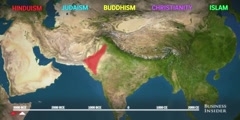Lec 14 -Mohammed and the Arab Conquests
"Lec 14 -Mohammed and the Arab Conquests"The Early Middle Ages, 284--1000 (HIST 210) In this lecture, Professor Freedman introduces Islam. He begins with a discussion of its geographical context: the dry desert lands of the Arabian peninsula. The Bedouins, or nomadic Arabs of the region, lived in a tribal society somewhat similar to the Germanic tribes discussed earlier in the course. Their raids against the Byzantine and the Persian Empire, for lack of strong opposition, would lead to the Arab conquests. The second half of the lecture focuses on the life of Mohammed (570/580 -- 632) and the early years of Islam. Mohammed's revelation was one of the unity of God and a progressive interpretation of God's prophets, with Mohammed as the last of these. Early Islam was slow to differentiate itself for Christianity and Judaism, though this process accelerated after Mohammed's flight to Medina in 622. Professor Freedman ends with a discussion of the tenets of Islam and anticipates the discussion of the Arab conquests in the next lecture. 00:00 - Chapter 1. Islam and Its Arabian Context 11:28 - Chapter 2. Bedouin Tribes 18:07 - Chapter 3. Mohammed 29:20 - Chapter 4. Mohammed in Medina and the Differentiation of Islam 39:14 - Chapter 5. The Tenets of Islam Complete course materials are available at the Open Yale Courses website: http://oyc.yale.edu This course was recorded in Fall 2011.
Video is embedded from external source so embedding is not available.
Video is embedded from external source so download is not available.
Channels: Political science
Tags: Lec 14 -Mohammed and the Arab Conquests
Uploaded by: yalemilddleages ( Send Message ) on 14-09-2012.
Duration: 43m 15s
Here is the next lecture for this course
The Golden Ratio in 1150 Lecture
05:12 | 4497 viewsLec 3 - The Greco-Roman World
48:42 | 2708 viewsHow religion spread across the world.
02:35 | 4557 viewsNo content is added to this lecture.
This video is a part of a lecture series from of Yale




